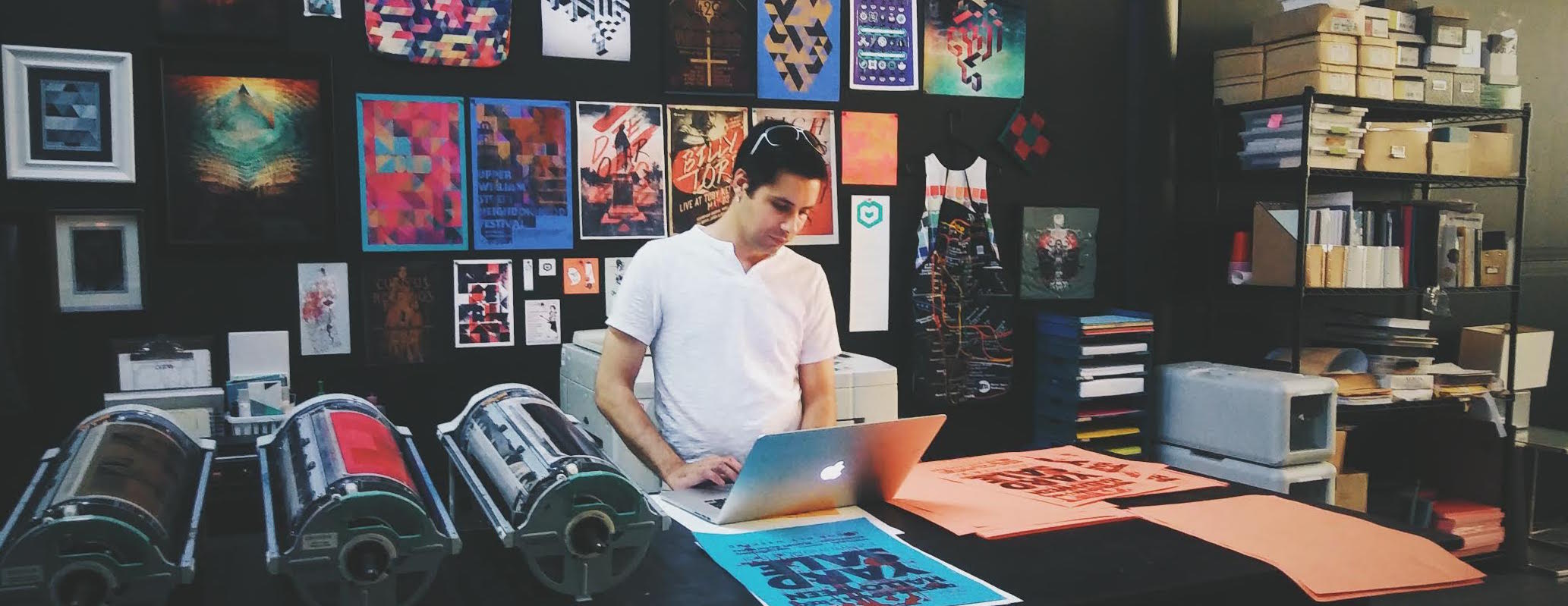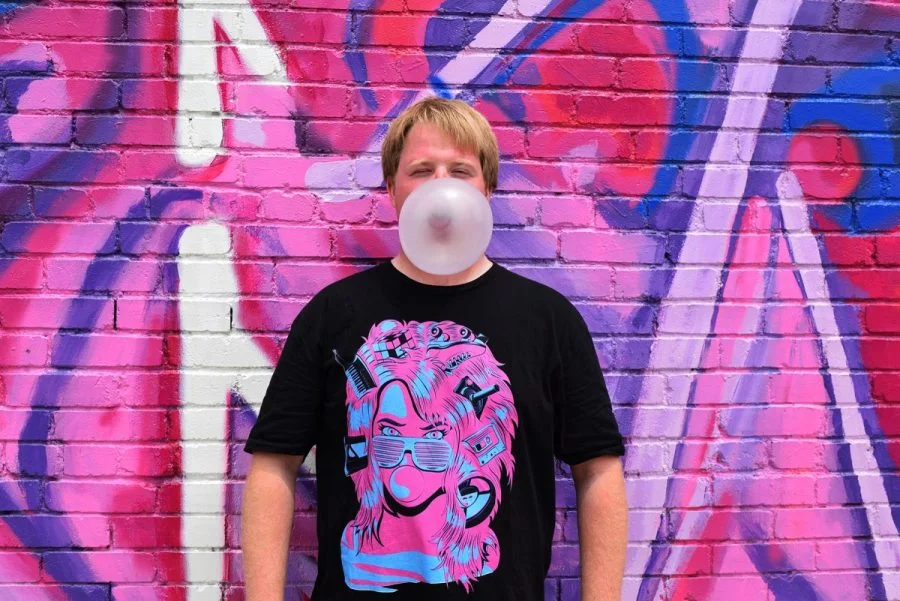Artist Interview: Spires
Since his emergence on the DBH scene in 2014, artist James Soares, a.k.a. Spires, has become a fan favorite with his awe-inspiring geometric designs. Join us as we learn more about one of DBH's most versatile digital artists.
Q: How long have you been drawing?
I used to draw as a kid, and all the way through high school I made physical art, painting and drawing, but as soon as I found the computer I never really looked back. A few years ago, I started working on my phone. The freedom with mobile art is that whenever I want to create something I have my phone with me. I can be in the grocery line and make something.
Q: Is being an artist your main job?
I started being financially successful close to 4 years ago. The first month in the on-demand world I only made $90, but the next month I made a lot more, and the month after that I made more than that. I was able to quit my job and simply focus on my art. It’s was very liberating; not many artists get the opportunity to work like this.
Right now I’m trying to start my own brand, and jump into online sales. I absolutely love my print on demand vendors, but it would be great to build my own brand. For instance, someone’s interested in producing my work on stained glass. There are all sorts of opportunities out there, and it’s always interesting to try new things.
Q: What is your muse? Where do you take your inspiration from in creating your work?
My work captures the tension between the artificial and organic, which is a metaphor for modern society. The strict lines of a particular geometric grid is the artifice; and the texture, color and lighting represent the organic.
From my moods or experiences, I try to capture however I’m feeling at the time in an abstract form. I work in color and shape, to capture the mood that I’m trying to achieve. Sometimes I attempt to connect to a color trend that in which I’m interested currently.
Q: If any artist alive or dead could examine and evaluate your work who would you want?
I think a lot of the best artists were in the renaissance and following centuries, or during the western classical era. I don’t regard modern art as valid necessarily, to society in terms of its proper historical function. I’m not sure how to answer your question. The disconnect between today’s art and classical art is wide, so I’m not sure some of the old masters could relate. Today’s art becomes a reflection point for the user’s subjective experience whereas art used to be culturally significant in context to a given people; we’ve gotten off the path of what art is about, especially in the West. I do wish art today had a deeper relevance and was more critical of today’s dominant ideas.
Q: What are you most passionate about in life?
Political theory; I’m really into politics, and I’ve been studying since I was in college. The political season this year is so exciting just to watch it unfold; a lot of my recent work reflects what I’m feeling in regards to this season’s politics.
Another passionate interest I have is printing, I used to manage a print center. That was a really great experience because I was able to lead a team. It was fun to blend all the challenges of taking in orders and creating high quality work.
Q: What kind of vision do you have for your future? And what is your immediate next step toward achieving it?
I would love to create community printing shops based on Risograph technology. I would like for Spires to be its own brand, possibly as part of a community based retail print center. These centers would blend what the local business needs with what the artists needs because there’s definitely a disconnect now.
When a larger company is printing for a community, the bonds in that community are somewhat broken down. You can see a healthier dynamic a little more in the garment industry, sometimes you’ll have a local screen printer that everyone knows, but a Risograph community print shop could do the same thing for the document industry.
You’d need to hire a designer, and the printer would have specific skills; this means that more artistic people could be more involved, and a community could be established, merging old skills with new technology. Digital printing is convenient for massive employers, but disempowers designers and printers.
Imagine a print shop that was also a library and a design space and you could come in and get a cup of coffee, read a book, and work with somebody that knows what’s going on in the community. A merging of the printer and designer really involves all of the skills necessary to bring together a community around art and printing. This is why Risograph technology is so important; it includes versatility, authenticity, limits, and challenge - so you get the benefits of technological progress while not losing the characteristics and authenticity of analogue printing, while not disenfranchising people who love this kind of work.
My immediate steps have been introducing people to Risograph, partnering with community and cultural organizations, and engaging local designers and artists to help promote the technology.
Q: What is the most important thing that you want to put out into the world?
As a society, we’ve gotten away from family life; we’re too individualistic. We’ve broken from the past in such a drastic way that we don’t even have the collective memory to realize how strange things are. We’re all caught up in technology, laden with college debt, disconnected from the past, and what we need is a return to the basic human values that we’ve thrown away in our rush to adopt all these novelties and untested values. Our culture is consumerist, not organic. I don’t consider us having evolved well enough to manage the changes successfully, as evidenced by the way things have progressed, from my point of view. Consider having kids earlier, and living for family. I could have focused on what I regard now as more important things earlier in life, and sometimes I wish that I had, even though it might have meant never becoming an independent artist.
Q: What would you call your best work?
Out of my geometric work, it’s one called Sylf Myyd. It’s a dark, dystopian, isometric pattern. I made it at a time when I had achieved what I thought I wanted: to be an independent artist. But at the time I wasn’t happy and I couldn’t figure out why I wasn’t feeling successful, given what I had achieved. The piece is really about how it takes more than just satisfying yourself creatively to have a meaningful, fulfilled life.
Q: Is there anything you particularly want to say to your fans, or to aspiring young artists?
To aspiring artists, I would say to critically question and perhaps reject any ideological influence from your contemporary art education. Also, unless you’re an engineer or in a field where it is absolutely required, ditch university because the debt is not worth it. Find a master and work for them, and learn your craft as an apprentice. Start early.
Part of living in the world is realizing the wider context and that finding your niche is not selling out. You have to find the sweet spot between yourself and the world in order to make work that is significant in a larger way. Before modernism, artists had a responsibility to society, to poke fun where necessary, comment as necessary, but also to build it up where appropriate, and to justify the historical struggle of a particular peoples represented by historical figures or those of folk mythology. Explore the traditional paradigm of art. I think the modern obsession with subjective value has defocused aesthetics generally. Symbolism has dethroned representation and realism. I’m participating in the modern paradigm as well, about which I have reservations.
There’s more important things than expressing yourself individually; any work you make will implicitly be yours. You have to find a market; find your niche. Where you fit, you can make the most significant contributions.
To my fans, thank you so much for inviting my work into your life, and subsequently providing the means by which I live independently.












